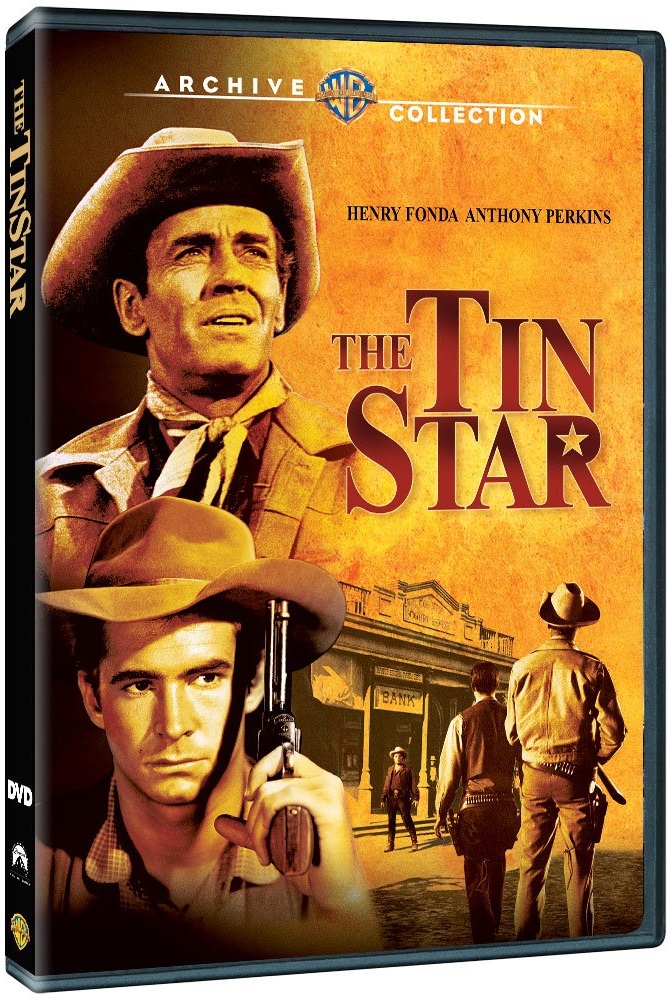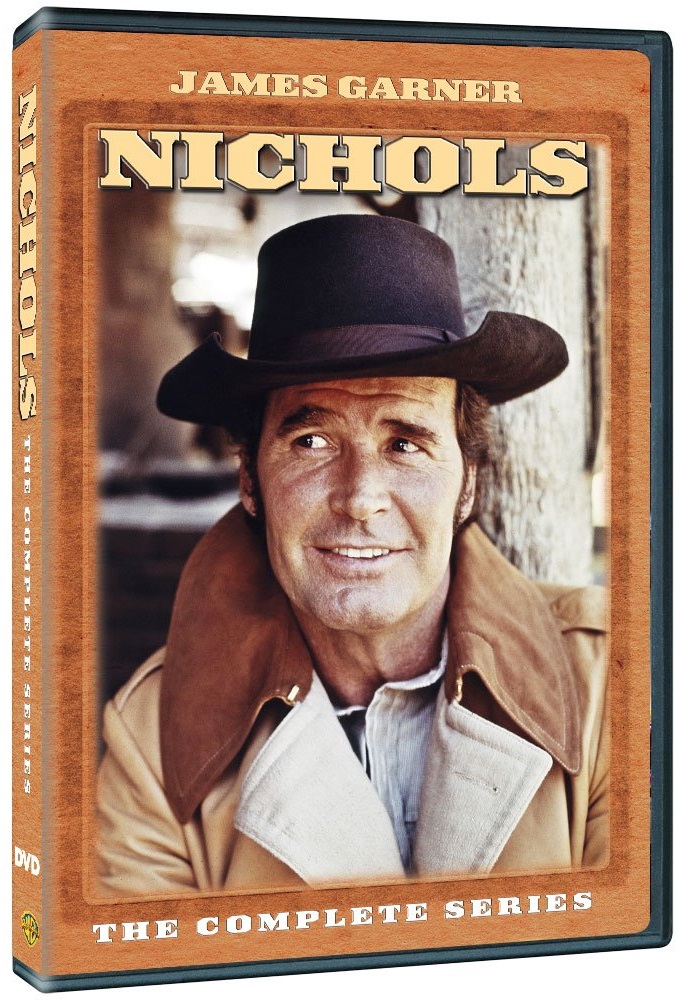
In the annals of the western, there is perhaps no greater character than that of the local sheriff. Sometimes he’s just as ornery as the resident villain’s sadistic henchman (heck, sometimes he is the resident villain’s sadistic henchman). Other times, he’s an old, weary fellow who is ready for that great round-up in the sky. And then there’s that quintessential hero type who is both quick on the draw and guaranteed to save the community at any given time. But what we usually don’t see in these cinematic (or even episodic) tales of the old west are greenhorn newbies taking the reigns of law enforcement, or a total antihero who never wanted the job in the first place.
This has now changed, of course, thanks to the Warner Archive, who have recently released two oddball western titles from their vaults for all to enjoy. The first – 1957’s The Tin Star – had previously been available on DVD from Paramount, before succumbing to that dreaded out-of-print phase many a disc collector searches for on eBay. The second, Nichols: The Complete Series, is a quirky comedy that has rarely been seen since its original NBC airing in the early ’70s.
In The Tin Star, we witness an Oscar-nominated tale of unlikely friendship spawned between two polar opposites. When Morg Hickman (Henry Fonda, in a part that was written for Jimmy Stewart) wanders into town one day with a fresh corpse adorning his packhorse, he is instantly confronted with hostility and fear from the locals. But the act in which this contribution to the land of the dead has been committed was in a strictly legal sense: Hickman is a hardened bounty hunter with a secret past, and the deceased in question decorated many a sheriff’s office with the word “Wanted: Dead or Alive”. Speaking of sheriffs, local lawman Ben Owens (Anthony Perkins) is still new to the game, and is considerably wet behind the ears when it comes to standing up for himself.
Over the course of a few short days, Morg reluctantly begins to counsel young Ben (who greatly admires the older, experienced fellow) in the ways of holding his own out in the west – from handling a six-shooter to dealing with the town’s neighborhood bully, the oddly-named Bart Bogardus (Neville Brand, who had been playing heavies for so long by this point, he could do it in his sleep), who also happens to be kin to Morg’s bounty! For a 1957 film, The Tin Star touches upon a number of subjects that were unusual for its time: lead actress Betsy Palmer (yes, Jason Voorhees’ mum) is a strong, independent woman living on her own with a half-white son (Michael Ray).
Frequent John Ford writer Dudley Nichols penned the screenplay based on the original Joel Kane/Barney Slater story, Anthony Mann directs, and an already-established Elmer Bernstein composed the score for this one-of-a-kind classic. John McIntire costars as the well-respected town physician, Lee Van Cleef (a few years away from achieving immortality in the Spaghetti Western genre) is a baddie, while Howard Petrie (and his magnificent voice) plays the mayor. A special shout goes out to the late Frank Cady (the only character actor to ever emerge from my hometown), who is cast as an uncredited extra here.
The Warner Archive’s issue of The Tin Star is essentially the same disc that was previously released by Paramount in 2004 – with a new FBI warning and a few slight changes to the cover art being the only differences to this release. As such, this is the same nice presentation with an anamorphic 1.85:1 aspect ratio and your choice of either a newly-mixed 5.1 Dolby Digital or original theatrical mono audio (still no extras, sorry), only without an outrageous “OOP!” price tag – which is something to shoot up the local saloon over in itself.

Moving on, we find ourselves transitioning from the black-and-white heroic world of grandiose ’50s cinema to the colorful laid-back land of mellow ’70s television – and I can think of no better contribution to such a subgenre than Nichols: The Complete Series. Originally broadcast during the 1971-1972 season on NBC, Nichols brought perplexed viewers a weekly scrimmage with contemporary stereotypical TV shows of the time – wherein an always-eager James Garner was more than happy to show off both his rugged good looks and those inimitable skills he had honed whilst making Maverick, and which he would perfect by the time The Rockford Files rolled around a few years later.
Here, Garner is Nichols, who spent the last 18 years in the army after leaving home because he was fed up. Now fed up with the army and its gun-happy ways, Nichols returns to his hometown (Nichols, Arizona) only to find his remaining (and as yet, known) family has passed away, and the farm has been taken over by others. After meeting the peculiar selection of odd locals, Nichols winds up grudgingly taking on the role of sheriff – after local ranch matriarch Ma Ketcham (Neva Patterson) enlists him in order to pay off his own ever-increasing debt. Opting to ride one of them newfangled motorcycles instead of a horse, and never choosing to carry a gun, Nichols enforces the law his own way, offering unique (and sometimes twisted) methods of solving the problems that pop up in the new world of 1914 – such as what to do with the world’s first automobile thief.
Margot Kidder is the local slutty barmaid, who serves as Ketcham’s infrequent love interest, while the great John Beck and Stuart Margolin (who takes every opportunity to ham it up) make for a most amusing pairing of idiots as the eldest Ketcham offspring and Nichols’ own joke of a deputy, respectively. M. Emmet Walsh cuts his onscreen acting teeth in a few episodes as a local leader. Ricardo Montalban, Strother Martin, Jack Elam, Scatman Crothers, Bo Hopkins, Joyce Van Patten, Rance Howard, and Tom Skerritt are just some of the guest stars in this short-lived and odd series – with one of the most notable guest starring roles being assigned to veteran heavy Anthony Zerbe in the season finale, whose character made for a very drastic change in the show’s formula once ratings began to plummet.
Ironically, the whole show was cancelled before the finale aired – eliminating the possibility of a nice clean ending (though we still kinda get one to some degree), or allowing for the show to spread its new wings. The fact that some of the episodes were aired out of order (the third episode, “The Indian Giver”, was very clearly supposed to follow the pilot, but this was changed at the last minute, and a dubbed-in line at the beginning of the story was added to eliminate any confusion). Warner Archive presents all 24 one-hour episodes of the series on six discs in their original (intended) broadcast order. The presentation here is quite nice and well-balanced overall (though those dissolves look a bit funky), and the series is shown in its original 1.37:1 aspect ratio with mono sound.
Both titles come recommended, though for entirely different reasons. But then, these are two lawmen of completely different colors.